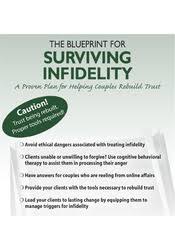Available for Pre-Order. This product will be available within a few days.
Laura Louis – The Blueprint for Surviving Infidelity
UNIQUE THERAPY ISSUES SURROUNDING THE ISSUE OF INFIDELITY
How therapists encounter infidelity
Reasons therapists feel incompetent
Potential deficits
Case study
MENTAL HEALTH AND INFIDELITY
Conceptualizing the infidelity as interpersonal trauma
Emotions and behavioral consequences of the infidelity
Infidelity and attachment
Ethical issues
Ideal therapist attributes
THE PLAN FOR REBUILDING TRUST AFTER INFIDELITY
Laying the foundation
Establishing parameters during intake session
Recognizing internal and external triggers for infidelity
Guidelines for both partners
Adding supports
Addressing the dangers of technology
Using cognitive behavioral therapy to explore the impact of the affair
Techniques for processing and expressing feelings
Explore past learned responses
Windows and walls
Case study
Installing security measures
Developing a plan of action and accountability
Affair preventing plan
The process of apology
Forgiveness
Stages of forgiveness
Role of therapist in facilitating forgiveness
Restoring intimacy
Developing compassion
Showing understanding
Making restitution
Would you like to receive Laura Louis – The Blueprint for Surviving Infidelity ?
Description:
Infidelity lays waste to relationships in countless ways. The injured party most often experiences trauma in unwanted memories, flashbacks, upsetting dreams, and severe emotional distress. The person who cheats may be coping with emotions of guilt, shame, and hopelessness. It can be incredibly difficult for therapists to guide couples through these intense emotions.
The process of moving couples from feelings of betrayal to feelings of forgiveness does not happen overnight, but reconciliation is possible with the right blueprint. Dr. Laura Louis presents that blueprint in this informative and engaging recording. Learn how to draw the plans for healing, starting with a foundation of important guidelines for both partners. Add the necessary supports including cognitive behavioral therapy, to help the partners process their feelings and to buttress the relationship against triggers for infidelity. Install atonement and accountability as security measures to protect against resentment and defensiveness.








